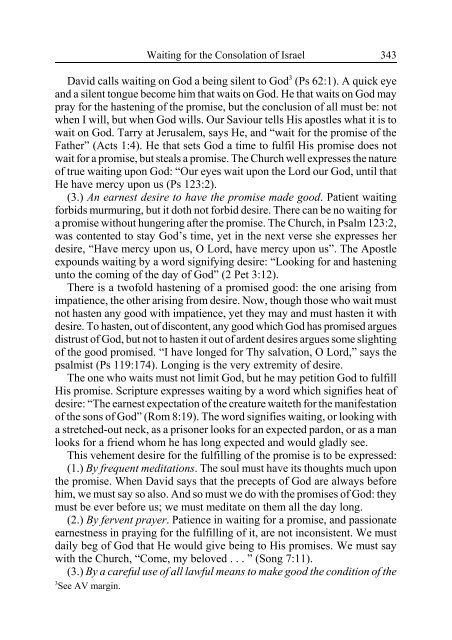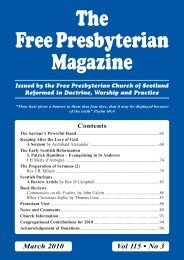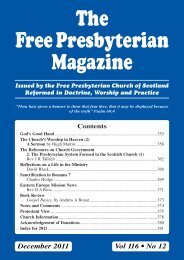The Free Presbyterian Magazine - Free Presbyterian Church of ...
The Free Presbyterian Magazine - Free Presbyterian Church of ...
The Free Presbyterian Magazine - Free Presbyterian Church of ...
Create successful ePaper yourself
Turn your PDF publications into a flip-book with our unique Google optimized e-Paper software.
Waiting for the Consolation <strong>of</strong> Israel 343<br />
David calls waiting on God a being silent to God<br />
3<br />
See AV margin.<br />
3 (Ps 62:1). A quick eye<br />
and a silent tongue become him that waits on God. He that waits on God may<br />
pray for the hastening <strong>of</strong> the promise, but the conclusion <strong>of</strong> all must be: not<br />
when I will, but when God wills. Our Saviour tells His apostles what it is to<br />
wait on God. Tarry at Jerusalem, says He, and “wait for the promise <strong>of</strong> the<br />
Father” (Acts 1:4). He that sets God a time to fulfil His promise does not<br />
wait for a promise, but steals a promise. <strong>The</strong> <strong>Church</strong> well expresses the nature<br />
<strong>of</strong> true waiting upon God: “Our eyes wait upon the Lord our God, until that<br />
He have mercy upon us (Ps 123:2).<br />
(3.) An earnest desire to have the promise made good. Patient waiting<br />
forbids murmuring, but it doth not forbid desire. <strong>The</strong>re can be no waiting for<br />
a promise without hungering after the promise. <strong>The</strong> <strong>Church</strong>, in Psalm 123:2,<br />
was contented to stay God’s time, yet in the next verse she expresses her<br />
desire, “Have mercy upon us, O Lord, have mercy upon us”. <strong>The</strong> Apostle<br />
expounds waiting by a word signifying desire: “Looking for and hastening<br />
unto the coming <strong>of</strong> the day <strong>of</strong> God” (2 Pet 3:12).<br />
<strong>The</strong>re is a tw<strong>of</strong>old hastening <strong>of</strong> a promised good: the one arising from<br />
impatience, the other arising from desire. Now, though those who wait must<br />
not hasten any good with impatience, yet they may and must hasten it with<br />
desire. To hasten, out <strong>of</strong> discontent, any good which God has promised argues<br />
distrust <strong>of</strong> God, but not to hasten it out <strong>of</strong> ardent desires argues some slighting<br />
<strong>of</strong> the good promised. “I have longed for Thy salvation, O Lord,” says the<br />
psalmist (Ps 119:174). Longing is the very extremity <strong>of</strong> desire.<br />
<strong>The</strong> one who waits must not limit God, but he may petition God to fulfill<br />
His promise. Scripture expresses waiting by a word which signifies heat <strong>of</strong><br />
desire: “<strong>The</strong> earnest expectation <strong>of</strong> the creature waiteth for the manifestation<br />
<strong>of</strong> the sons <strong>of</strong> God” (Rom 8:19). <strong>The</strong> word signifies waiting, or looking with<br />
a stretched-out neck, as a prisoner looks for an expected pardon, or as a man<br />
looks for a friend whom he has long expected and would gladly see.<br />
This vehement desire for the fulfilling <strong>of</strong> the promise is to be expressed:<br />
(1.) By frequent meditations. <strong>The</strong> soul must have its thoughts much upon<br />
the promise. When David says that the precepts <strong>of</strong> God are always before<br />
him, we must say so also. And so must we do with the promises <strong>of</strong> God: they<br />
must be ever before us; we must meditate on them all the day long.<br />
(2.) By fervent prayer. Patience in waiting for a promise, and passionate<br />
earnestness in praying for the fulfilling <strong>of</strong> it, are not inconsistent. We must<br />
daily beg <strong>of</strong> God that He would give being to His promises. We must say<br />
with the <strong>Church</strong>, “Come, my beloved . . . ” (Song 7:11).<br />
(3.) By a careful use <strong>of</strong> all lawful means to make good the condition <strong>of</strong> the

















